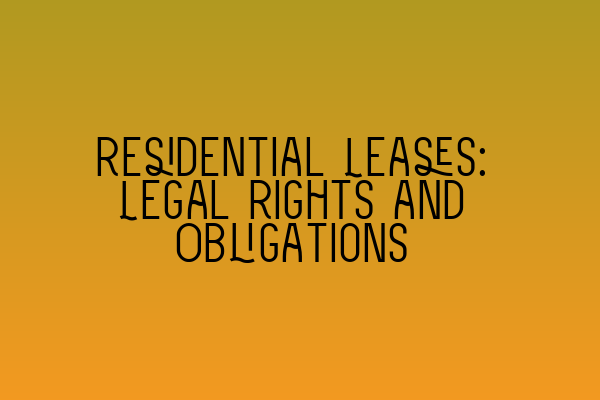Residential Leases: Legal Rights and Obligations
Residential leases play a crucial role in the property market, providing individuals with the opportunity to rent or lease a property for a specific period of time. However, understanding the legal rights and obligations associated with residential leases can be daunting for both landlords and tenants. In this blog post, we will delve into the intricacies of residential leases, shedding light on the key legal aspects that both parties should be aware of.
Introduction to Residential Leases
A residential lease, also known as a rental agreement, is a legally binding contract between a landlord and a tenant. It grants the tenant the right to occupy and use a residential property, while the landlord retains ownership of the property. The lease outlines the terms and conditions that govern the rental arrangement, including rent, duration, and obligations of both parties.
Tenant’s Rights and Obligations
Tenants have various legal rights that protect them during the tenancy period. One of the most fundamental rights is the right to quiet enjoyment, which ensures that tenants can peacefully live in the property without interference from the landlord. Additionally, tenants have the right to a safe and habitable living environment. Landlords are responsible for maintaining the property and ensuring that it meets the necessary health and safety standards.
Tenants are obligated to pay rent as stipulated in the lease agreement and within the agreed-upon timeframe. Failure to do so may result in late payment fees or eviction proceedings. Furthermore, tenants are typically responsible for the proper care and maintenance of the property, including routine cleaning and minor repairs. It is important for tenants to report any issues or necessary repairs to the landlord promptly.
To gain a comprehensive understanding of tenants’ rights and obligations, it is crucial to consult with an experienced property law solicitor who can guide both landlords and tenants through the legal complexities.
Landlord’s Rights and Obligations
Similarly, landlords have specific rights and obligations when entering into a residential lease. One of their key rights is the right to receive rent from the tenant as agreed upon in the lease. Landlords also have the right to inspect the property periodically, with proper notice, to ensure that it is being maintained properly.
Landlords have obligations to provide a safe and habitable property to their tenants. This includes addressing any issues that may affect the health and safety of the tenants. Furthermore, landlords must respect the privacy of their tenants and provide reasonable notice before entering the property.
It is important for landlords to understand that they cannot evict a tenant without following the proper legal procedures. The eviction process is strictly regulated and can only be initiated under specific circumstances, such as non-payment of rent or breach of lease terms.
Seek Professional Legal Advice
Residential leases can be complex, and it is crucial for both landlords and tenants to seek professional legal advice to ensure their rights are protected. Solicitors who specialize in property law are well-versed in the intricacies of residential leases and can provide valuable guidance throughout the lease agreement process.
For more information on residential leases and other legal topics, please visit our related articles:
- SQE 1 Practice Exam Questions
- SQE 1 Practice Mocks FLK1 FLK2
- SQE 2 Preparation Courses
- SQE 1 Preparation Courses
- SRA SQE Exam Dates
At SQE Property Law & Land Law, we have a team of experienced solicitors who can assist you with all aspects of residential leases. Contact us today to schedule a consultation and ensure that your legal rights and obligations are properly addressed.
